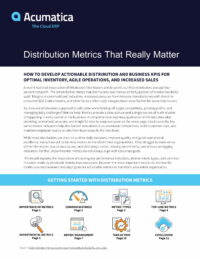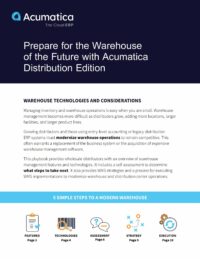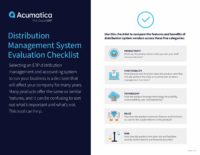How ERP Inventory Management Software Makes a Difference for Retailers
As a retailer, you’ve likely experienced common inventory management challenges, including unreliable tracking, supply chain issues, complicated packaging, and constantly evolving customer demands. As a result, you’ve also likely searched “how to manage inventory in retail store” and discovered there are a number of suggested best practices, such as implementing retail inventory management software within a comprehensive enterprise resource planning (ERP) solution.
Retail store inventory management software is a powerful tool that can help you manage your inventory as well as improve your efficiency and profitability. The software helps businesses like yours easily track inventory levels, as well as orders, sales, and deliveries from a centralized solution. It can also be used to create a work order, bill of materials, and other production-related documents.
With ERP inventory management software, you’re able to optimize your inventory and fulfillment processes by automating tasks, improving accuracy, and providing insights into inventory trends, which are all things that make customers happy. But keeping customers happy requires knowing which products customers need and want, and what prices they are willing to pay while also making sure that the desired products are easy to purchase and always available.
This always-available inventory is possible with modern ERP inventory management software, and it can also help you do the following:
- Accurately forecast inventory needs: ERP inventory management software can use historical data, demand signals, and other factors to predict future demand. This can help retailers avoid stockouts and overstocks, which can save money and improve customer satisfaction. For example, a modern ERP system can use historical sales data to forecast demand for the next month.
- Reduce shortages and excess inventory: ERP inventory management systems can automate the ordering process and provide real-time inventory visibility. This can help you ensure that you have the right amount of inventory on hand to meet demand, without having too much inventory that they need to sell at a loss. For example, a modern ERP system can automatically generate purchase orders when inventory levels reach a certain threshold. It can also track inventory levels in real time, so you can see how much inventory you have on hand and where it is located.
- Increase visibility across the retail pipeline: A modern ERP inventory management system can provide a single view of all of your inventory data. This can help you track inventory from the point of order to the point of sale, so you can see where any bottlenecks or inefficiencies are occurring. For example, a modern ERP system can track inventory levels in your warehouse, your retail stores, and your distribution centers. It can also track inventory in transit, so you can see when shipments are expected to arrive.
By accurately forecasting inventory needs, reducing shortages and excess inventory, and increasing visibility across the retail pipeline, a modern ERP inventory management software can help you improve your retail business’s efficiency and profitability, which leads to happy customers and a healthy bottom line.
 Canada (English)
Canada (English)
 Colombia
Colombia
 Caribbean and Puerto Rico
Caribbean and Puerto Rico
 Ecuador
Ecuador
 India
India
 Indonesia
Indonesia
 Ireland
Ireland
 Malaysia
Malaysia
 Mexico
Mexico
 Panama
Panama
 Peru
Peru
 Philippines
Philippines
 Singapore
Singapore
 South Africa
South Africa
 Sri Lanka
Sri Lanka
 Thailand
Thailand
 United Kingdom
United Kingdom
 United States
United States





